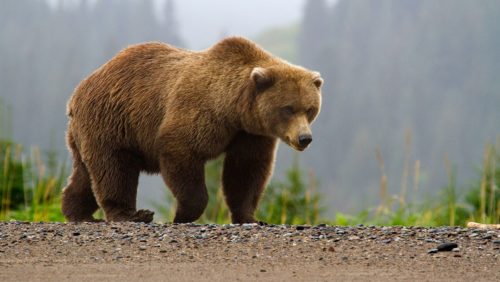Ar-bear-trary and Capricious: The Trump Administration Gets Grizzly
October 18, 2018 by Gregory Harned

This federal district court’s decision [to reverse the de-listing of the grizzly] has angered state officials and sparked a new debate about federalism and institutional competence
In September 2018, a federal judge in the United States District Court for the District of Montana, Missoula Division, restored protection for grizzly bears within the Greater Yellowstone Ecosystem under the Endangered Species Act (ESA).[1] This order interrupted the first grizzly hunts in forty-four years which proponents argue are necessary to protect livestock, deer, and elk populations.[2]
The Yellowstone grizzly bear is one of the most iconic species in Yellowstone National Park and was added to the endangered species list in 1975.[3] Since gaining this designation, officials and stakeholders have debated whether such restrictive protections are necessary to ensure the survival of the species.[4] State officials first attempted to de-list the Yellowstone grizzly bears in 2007 by arguing that the population had recovered;[5] however, in 2009, the district court struck down that rule on the grounds that the grizzly bears’ habitat and food were threatened by climate change.[6]
Upon coming into office, the Trump administration aggressively pushed to reduce protections for endangered wildlife, both domestically and internationally. The administration first faced negative attention when the US Fish and Wildlife Service (FWS) reversed its ban on the import of hunting trophies from Zambia and Zimbabwe.[7] The announcement was met with public outcry from citizens skeptical of the Trump administration’s motivations.[8]
In June 2017, the FWS announced that the Yellowstone grizzlies would cease to be listed as a threatened species under the ESA.[9] Shortly afterwards, states including Idaho, Wyoming and Montana, scheduled grizzly bear hunts for September 2018.[10] The September 2018 order vacates the FWS Final Rule de-listing the Yellowstone grizzly bears and restores their ESA status finding that the FWS failed to make a reasoned decision as required by the APA.[11] The Agency’s decision-making was inadequate because FWS refused to consider the legal and functional impact of de-listing the Yellowstone grizzlies on other grizzly populations.[12] FWS’s analysis of the threats facing the Yellowstone grizzlies was arbitrary and capricious because it contrary to the best available science.[13]
This federal district court’s decision has angered state officials and sparked a new debate about federalism and institutional competence. Beyond appealing this court’s decision, state officials may move to change the ways that wildlife is managed in their states by removing it from the reach of the federal government.[14] Wyoming U.S. Rep. Liz Cheney publicly denounced this decision and argued that federal control wildlife management disincentivizes state wildlife managers and citizens.[15] Accordingly, Rep. Cheney introduced legislation to remove the Yellowstone grizzlies from the ESA list and prohibit courts from overruling that determination.[16] This move embodies one these critics’ strongest arguments: that judges may lack the institutional competence to determine how to best manage wildlife.
However, as the court noted, state governments have not demonstrated the ability to effectively conserve wildlife without federal oversight.[17] While courts may not be experts in conservation itself, they are experts in evaluating process. In reviewing this rule, the court is exercising its constitutional right of judicial review, thus holding the FWS accountable to the procedures mandated by the APA, the ESA’s “best available science standard,” and circuit court precedent, while preserving the integrity of our legal system.[18] The court was correct to vacate the rule removing protections for the majestic Yellowstone grizzly bear.
[1] National Park Service, Grizzly Bears & the Endangered Species Act, https://www.nps.gov/yell/learn/nature/bearesa.htm (last updated Oct. 5, 2018).
[2] Erin McCarthy Holliday, Federal Judge Blocks First Northwest Grizzly Hunt In 44 Years, Jurist
(August 31, 2018), https://www.jurist.org/news/2018/08/federal-judge-blocks-first-northwest-grizzly-hunt-in-44-years/.
[3] Sarah Gibbens, Court Blocks Grizzly Bear Hunt—Why It’s So Controversial, (September 25, 2018), https://www.nationalgeographic.com/environment/2018/09/news-yellowstone-grizzly-bear-endangered-hunting/.
[4] Id.
[5] Id.
[6] Greater Yellowstone Coalition, Inc. v. Servheen, 672 F.Supp.2d 1105 (D. Mont. 2009).
[7] See Jamiles Lartey, Trump Sons’ Hunting in Focus as US Lifts Import Ban on African Elephant Trophies, The Guardian (November 16, 2017), https://www.theguardian.com/us-news/2017/nov/16/trump-sons-us-lifts-import-ban-african-elephant-trophies.
[8] Id.
[9] Endangered and Threatened Wildlife and Plants; Removing the Greater Yellowstone Ecosystem Population of Grizzly Bears From the Federal List of Endangered and Threatened Wildlife, 82 Fed. Reg. 30502 (propose June 30, 2017) (to be codified at 50 C.F.R. pt. 86).
[10] See Holliday, supra note 2; Mead Gruver, Wyoming, Idaho Weigh Options After Grizzly Hunt Ruling, AP (September 25, 2018), https://apnews.com/30a8f66939fc4da982e2e2f6d6414148.
[11] Crow Indian Tribe v. United States, CV 17—89—M—DLC, at 1-3 (D. Mont. 2018) (order vacating final rule).
[12] Id. at 13-15.
[13] Id. at 35-39.
[14] Gruver, supra note 9.
[15] See Cheney Introduces Legislation Directing Dept. of the Interior to Re-issue Rule Delisting Grizzly Bear, Prohibit Further Judicial Review of Decision, Liz Cheney, Proudly Working for Wyoming, (Sept, 25, 2018), https://cheney.house.gov/2018/09/25/legislation-delist-grizzly-bear/; see also Gruver, supra note 9.
[16] Cheney Introduces Legislation Directing Dept. of the Interior to Re-issue Rule Delisting Grizzly Bear, Prohibit Further Judicial Review of Decision, supra note 14.
[17] Crow, CV 17—89—M—DLC at 31-32.
[18] Id. at 28-29 (citing San Luis & Delta-Mendota Water Authority v. Locke, 776 F.3d 971, 995 (9th Cir. 2014).

